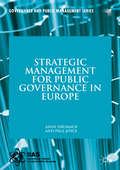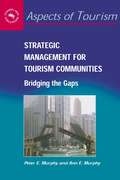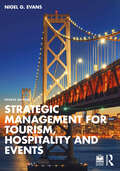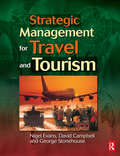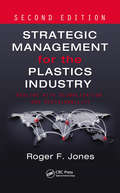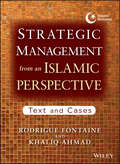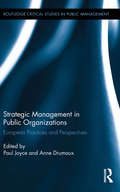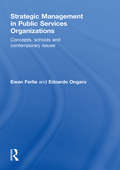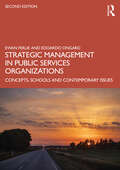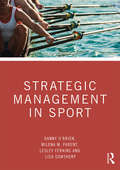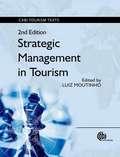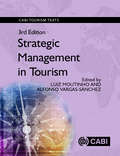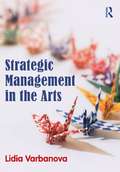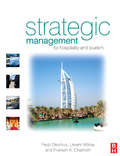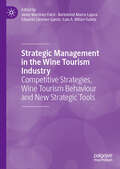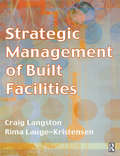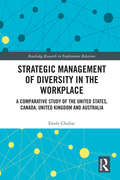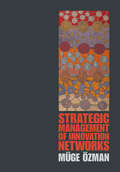- Table View
- List View
Strategic Management for Public Governance in Europe
by Paul Joyce Anne DrumauxThis book investigates the role and effectiveness of strategic management within public governance in Europe. Using findings from qualitative studies, it explores the governance processes at the level of the European Union as a supranational institution, and the level of national governments. It presents empirical research that reveals fresh insights into the extent to which the public, effective government, and desirable societies are interrelated in individual Member States. Further, it enables the authors to critically analyse and develop the concept of the 'Strategic State', and to introduce the idea of 'credible government' that lays out a pathway to effective governance. This book argues for the need to develop more effective multi-level governance that combines unity of strategic purpose at the European level with strategic leadership and mobilisation at the national level. It will appeal to practitioners in addition to scholars in the fields of public policy, public management and European Union studies.
Strategic Management for Tourism Communities
by Peter E. Murphy Ann E. MurphyStrategic planning within a community framework is essential for tourism to reach its potential. This book combines the four principal functions of business management and stakeholder analysis to develop a model of collaborative decision making. This model offers a template for communities to understand and make the most of their tourism resources.
Strategic Management for Tourism, Hospitality and Events
by Nigel EvansStrategic Management for Tourism, Hospitality and Events is the must-have text for students approaching this subject for the first time. It introduces students to fundamental strategic management principles in a Tourism, Hospitality and Events context and brings theory to life by integrating a host of industry-based case studies and examples throughout. Among the new features and topics included in this edition are: Extended coverage to Hospitality and Events to reflect the increasing need and importance of a combined sector approach to strategy New international Tourism, Hospitality and Events case studies from both SME's and large-scale businesses are integrated throughout to show applications of strategic management theory, such as objectives, products and markets and strategic implementation. Longer combined sector case studies are also included at the end of the book for seminar work. New content on emerging strategic issues affecting the tourism ,hospitality and events industries, such as innovation, employment, culture and sustainability Web Support for tutors and students providing explanation and guidelines for instructors on how to use the textbook and case studies, additional exercises, case studies and video links for students. This book is written in an accessible and engaging style and structured logically with useful features throughout to aid students' learning and understanding. This book is an essential resource to Tourism, Hospitality and Events students.
Strategic Management for Tourism, Hospitality and Events
by Nigel EvansStrategic Management for Tourism, Hospitality and Events is the must-have text for students approaching this subject for the first time. It introduces students to fundamental strategic management principles in a tourism, hospitality and events context and brings theory to life by integrating a host of industry-based case studies and examples throughout. Among the new features and topics included in this third edition are: New and fully updated international case studies from both SMEs and large-scale businesses integrated throughout to show the various applications of strategic management theory. More extensive combined sector case studies on relevant topics such as Airbnb are also included at the end of the book for seminar work. New content on relevant topics such as big data, artificial intelligence, political external environment, social media and e-marketing, sustainability and CSR, absorptive capacity, and innovation. Web support for tutors and students providing explanation and guidelines for instructors on how to use the textbook, as well as supplementary exercises, case studies and video links for students. This book is written in an accessible and engaging style and structured logically with useful features throughout to aid students’ learning and understanding. It is an essential resource for tourism, hospitality and events students.
Strategic Management for Tourism, Hospitality and Events
by Nigel G. EvansStrategic Management for Tourism, Hospitality and Events is the must-have text for students approaching this subject for the first time. It introduces students to fundamental strategic management principles in a tourism, hospitality and events context and brings theory to life by integrating a host of industry-based case studies and examples throughout. This fourth edition has been fully revised and updated to reflect the major changes in strategic direction for these industries due to the most significant global crisis ever, as well as significant technology advances and issues related to sustainability. New features and topics in this fourth edition include: New international tourism, hospitality and events case studies from both SMEs and large-scale businesses are integrated throughout to show applications of strategic management theory. New Technology Focus short cases are included, as well as longer combined sector case studies on topics such as COVID-19 impacts. A new chapter on sustainability and corporate social responsibility explores how the principles of sustainability can be incorporated into the strategy of tourism, hospitality and events organizations. Technology is integrated into all chapters, looking at big data, artificial intelligence, the external political environment, social media and e-marketing, absorptive capacity and innovation. Impacts and implications of COVID-19 are discussed, considering industry responses, financial implications and future emergent strategies. A contemporary view incorporates the broad range of academic literature and industry developments that have emerged in recent years and provides a particular focus on smaller organizations, recognizing their key role. Web support for tutors and students provides explanations and guidelines for instructors on how to use the textbook and case studies, additional exercises and video links for students. This book is written in an accessible and engaging style and structured logically, with useful features throughout to aid students’ learning and understanding. It is an essential resource for tourism, hospitality and events students.
Strategic Management for Travel and Tourism
by David Campbell George Stonehouse Nigel EvansStrategic Management for Travel and Tourism is the must-have text for students studying travel and tourism. It brings theory to life by using industry-based case studies, and in doing so, 'speaks the language' of the Travel and Tourism student.Among the new features and topics included in this edition are:* international case studies from large-scale businesses such as Airtours, MyTravel and South West Airlines * user-friendly applications of strategic management theory, such as objectives, products and markets and strategic implementation, together with illustrative case studies, and longer case studies for seminar work and summaries* contemporary strategic issues affecting travel and tourism organizations, such as vertical integration and strategic alliancesStrategic Management for Travel and Tourism is a well-rounded book, ideal for all undergraduate and postgraduate students focusing on strategy in travel and tourism.
Strategic Management for the Plastics Industry: Dealing with Globalization and Sustainability, Second Edition
by Roger F. JonesAny general management book can give you the basics of quality assurance, strategic planning, logistics, and more. But how do you apply that knowledge to a company that requires not only sound business practices but also sound science to succeed? And how do you deal with the impact of globalized competition, a fluctuating world economy, and growing
Strategic Management from an Islamic Perspective
by Rodrigue Fontaine Khaliq AhmadFascinating insights into modern strategic management from an Islamic perspectiveWhile strategic management is a cornerstone of any MBA program, it's almost always taught from conventional theories and typically American case studies. This book takes those traditional theories and interprets them from an Islamic perspective using more international case studies. Though primarily intended as a textbook for business students, the book is also extremely useful for any Muslim business leaders who want to transform their businesses while complying with Shariah, with a particular focus on developing corporate cultures and structures in sync with Islamic values.Offers a critical review of conventional strategic management theory, suggesting more effective alternatives based on a combination of conventional and Islamic theoriesIncludes international case studies, each with a particularly Islamic angleWritten by a successful author team that has written extensively on the subject of business management from an Islamic perspective
Strategic Management in East European Ports (Routledge Revivals)
by Michael Roe Susanne FerchFirst published in 1998, this volume emerged as part of the series Plymouth Studies in Contemporary Shipping, which represents a unique collection of papers and texts edited from the leading maritime institute in Western Europe at the University of Plymouth. Covering research from a range of geographical sectors but with a particular emphasis on Western Europe, developing countries and Eastern Europe the topics covered emerge from the full range of business areas including maritime economics, policy, statistics, logistics, law and business studies. Designed for both the practising academics and the shipping and ports industry itself, this series is an original and novel contribution to the maritime debate. This particular volume focuses on ports in Poland and Eastern Europe more widely as transition economies after the fall of the Soviet Union. Susanne Ferch and Michael Roe examine their use of strategic management systems to determine whether and how the highly turbulent environment is reflected in the systems at Poland’s largest ports, Gdynia and Gdañsk. Particular focus is given to inter-port variations.
Strategic Management in Public Organizations: European Practices and Perspectives (Routledge Critical Studies in Public Management #20)
by Paul Joyce Anne DrumauxStrategic Management in Public Organizations: European Practices and Perspectives offers the first wide-ranging survey and assessment of strategic management practices at various levels of government and public service in European countries. It shows that strategic management is much more than a management tool imported from the private sector - it has become a key element of public management reforms, and European governments at all levels are developing ‘strategic state’ characteristics. Written by leading European experts on strategic management in the public sector and in government, this book presents evaluations and analysis based on empirical investigations. The book covers strategic management at different levels of government, explore the roles of different players, and incorporate theory and practice, with opening and concluding chapters by the editors that provide an overview of strategic management in the public services and a cross-societal discussion of practices, reforms, and lessons. It reflects not only developments in strategic management practices in the European public sector, but also the increasing importance of strategic capabilities for the modernization of public governance. This book is ideal for students in postgraduate management courses (MPA, MSc, or MBA) in Europe and elsewhere.
Strategic Management in Public Services Organizations: Concepts, Schools and Contemporary Issues
by Ewan Ferlie Edoardo OngaroStrategic Management in Public Services Organizations sets out to connect the two traditionally disparate academic literatures of public management and strategic management. The authors argue that some models of strategic management are now of enhanced relevance for contemporary public services organizations, especially when considering successive New Public Management reforms. This observation has important consequences for the requisite work practices, skills and knowledge bases of current public managers, as they are increasingly being asked to act as strategic as well as operational managers. Strategic Management in Public Services Organizations takes a strongly comparative and international perspective in addressing the fundamental issue of strategic management within diverse public administrative traditions. The impact of strategic management on the performance of public agencies is examined and it is argued that the appropriate use of strategic management models depends on the politico-administrative and cultural contexts of the public services organization in question, concluding that there is no single best way to strategically lead public organisations. This is an advanced textbook aimed at the postgraduate level, particularly students on MPAs and MBAs with a public sector option or MScs in Public Policy and Public Management.
Strategic Management in Public Services Organizations: Concepts, Schools and Contemporary Issues
by Ewan Ferlie Edoardo OngaroStrategic Management in Public Services Organizations takes a comparative and international view on the appropriate use of strategic management models that are affecting the way public services organizations are managed. In an era of New and post New Public Management reforms, public managers at all levels are expected to respond to these new approaches, which profoundly affect their work practices, skills, and knowledge bases. Choosing a promising strategic management model and implementing it in a way that works for the organization or inter-organizational network in question also depends on an understanding of local politico-administrative and cultural contexts: this book helps the readers identify how to successfully tailor strategic management approaches to their specific circumstances and needs. This second edition builds upon the successes of the well-received first edition. Thoroughly updated to help public managers meet the challenges of a new decade, it has a refreshed collection of mini-cases and now includes chapter summaries. It also includes a new chapter on collaborative strategy and co-creation, in response to the growth of interest in more open forms of public policymaking. This is an advanced textbook aimed at the postgraduate level, particularly students on MPAs and MBAs with a public sector option or MScs in public policy and public management.
Strategic Management in Sport
by Milena M. Parent Danny O'Brien Lesley Ferkins Lisa GowthorpWhat role can strategic thinking play in contemporary sport management? It can be the difference between leading or languishing – it’s that important! Covering sport at all levels, from community-based sport to elite sport, this is the first textbook to focus on strategic management in a sport context. The book introduces the fundamentals of strategic planning, environmental analyses, strategic direction and leadership, strategy formulation and selection, implementation, strategic control, and change management. Designed to encourage students to develop a strategic mindset, as well as critical thinking and problem-solving skills, the book unpacks key concepts such as leadership, governance, organizational change, and the multiple layers of strategy in sport. Full of real-world case studies from diverse, international sport business environments, and useful pedagogical features such as review questions and guides to online resources, this is an essential text for any sport management course and an invaluable resource for sport development, recreation management, or events management courses.
Strategic Management in Tourism
by James Wilson Larry Dwyer Dimitrios Buhalis Stephen Witt Geoff Southern Luiz Moutinho Enrique Bigné Jithendran Kokkranikal Anne-Mette Hjalager D Parra LópezFully updated with new chapters linking strategic thinking and action in the management of tourism, this comprehensive textbook provides an analytical evaluation of the most important global trends in tourism and analysis of the impact of crucial environmental issues and their implications and the major factors affecting international tourism management. Following a successful first edition that is now a mainstream textbook in tourism courses, the book also covers marketing strategy, functional management and strategic planning in order to provide an integrated synthesis that will benefit students in their future careers, and also be useful to professionals working in the tourism sector.
Strategic Management in Tourism (CABI Tourism Texts)
by James Wilson Larry Dwyer Yvette Reisinger Brent Ritchie Geoff Southern Luiz Moutinho Anne-Mette Hjalager Scott McCabe Mercedes Melchior-Navarro María Moral-Moral Eduardo Parra-López Shirley Rate S. F. Witt Vanessa Yanes-Estévez Ronnie Ballantyne Yawei Jiang Jithendran Kokkamikal Dawn Gibson Kun-Huang Huarng José Alberto Martínez-González Tiffany Hui-Kuang Yu Professor Noel Scott Alejandro Pérez-Ferrant Professor Alfonso Vargas-Sánchez Kanes Rajah Rafael Alberto PérezThis comprehensive textbook has, at its core, the importance of linking strategic thinking with action in the management of tourism. It provides an analytical evaluation of the most important global trends, as well as an analysis of the impact of crucial environmental issues and their implications. Fully updated throughout, this new edition: -Covers forecasting, functional management and strategic planning; -Includes extra chapters to incorporate a wider spread of important topics such as sustainability, authenticity and crisis management; -Contains pedagogical features throughout, such as learning objectives, questions and case studies to aid understanding Now in its third edition, and reviewing the major factors affecting international tourism management, this well-established student resource provides an essential overview of strategic management for students and professionals in the tourism sector.
Strategic Management in the Arts
by Lidia VarbanovaStrategic Management in the Arts looks at the unique characteristics of organisations in the arts and culture sector and shows readers how to tailor a strategic plan to help these diverse organizations meet their objectives. Strategic management is an essential element that drives an organisation’s success, yet many cultural organizations have yet to apply strategic thinking and entrepreneurial actions within the management function. Varbanova reviews the existing theories and models of strategic management and then relates these specifically to cultural organisations. Also included are sections on entrepreneurship and innovations in the arts, considering the concept of a ‘learning organisation’ – an organisation able to adapt its strategy within a constantly changing, complex environment. The book is structured to walk the reader through each element of the strategic plan systematically. With a fresh approach, key questions, examples, international cases to connect theory with practice and suggestions for further reading, this book is designed to accompany classes on strategic planning, cultural management or arts management.
Strategic Management in the Garment Industry (Woodhead Publishing India Ser.)
by Gordana ColovicFrom supply chain finesse to market triumph, this book covers the advancements in business strategy and presents a multidisciplinary approach to strategic management in the garment industry. The subject matter of this book discusses – Strategic management Strategic marketing in garment industry Strategic methods Organizational behaviour Print edition not for sale in South Asia (India, Sri Lanka, Nepal, Bangladesh, Pakistan and Bhutan)
Strategic Management in the International Hospitality and Tourism Industry: For Hospitality And Tourism
by Prakash Chathoth Levent Altinay Fevzi OkumusStrategic Management for Hospitality and Tourism is a vital text for all those studying cutting edge theories and views on strategic management. Unlike others textbooks in this area, it goes further than merely contextualizing strategic management for hospitality and tourism, and avoids using a prescriptive, or descriptive approach. It looks instead, at the latest in strategic thinking and theories, and provides critical and analytical discussion as to how and if these models and theories can be applied to the industry, within specific contexts such as culture, profit and non-profit organizations. This title also provides online support material for tutors and students, in the form of guidelines for instructors on how to use the textbook, PowerPoint presentations and case studies plus additional exercises and web links for students.
Strategic Management in the Maritime Sector: A Case Study of Poland and Germany (Routledge Revivals)
by Michael RoeFirst published in 1999, this volume explores port strategic management in Poland and Germany. It is part of the Plymouth Studies in Contemporary Shipping series represents a unique collection of papers and edited texts from the leading maritime institute in Western Europe at the University of Plymouth. It covers all aspects of the industry from operations through to the logistical framework that supports the sector. Designed both for practising academics and the shipping and ports industry itself, the series, combining the output for some of the leading academic commentators in the world from the UK, Korea, Germany and Poland, is an original and novel contribution to the maritime debate.
Strategic Management in the Public Sector (Masters in Public Management)
by Paul JoyceStrategic management is widely seen as essential to the public services, leading to better performance and better outcomes for the public. In fact, the private sector idea of strategic management has become so powerful in the public sector that politicians and policy makers have begun to talk about the importance of the modern state being strategic – and we may be witnessing the emergence of the Strategic State. Strategic Management for the Public Sector draws on experience and research from a range of countries and provides a theoretical understanding of strategic management that is grounded in the public sector. Drawing on the latest theory and research this text provides a fresh look at foresight, analysis, strategic choice, implementation and evaluation. This book also offers original and detailed case studies based on up to date evidence from different public sector settings, helping the reader to build on their understanding of theories and concepts presented earlier in the book. Strategic Management for the Public Sector has been written specially for managers and students taking postgraduate courses such as MBAs and MPAs. It will also appeal to individual managers and civil servants in the public sector looking for an accessible book to read as part of their own independent personal development.
Strategic Management in the Wine Tourism Industry: Competitive Strategies, Wine Tourism Behaviour and New Strategic Tools
by Javier Martínez-Falcó Bartolomé Marco-Lajara Eduardo Sánchez-García Luis A. Millán-TudelaWine tourism has become increasingly popular and important in recent years, with a vast scientific research highlighting the expansion of the industry and the various benefits associated with it. As the global wine market grows, new competitive strategies, business tools and patterns of wine tourists’ demands are essential elements for the effective management of wine tourism products. This book aims to deepen the management of the wine tourism industry through the study of competitive strategies developed by wineries. It also explores perceptions, preferences, and expectations of wine tourists, as well as the analysis of new tools to improve the wine tourism product. In doing so, contributors make the case for effective strategic management that can help wineries determine their target markets, identify their competitive advantages, develop pricing strategies and create effective marketing campaigns. The book is therefore useful for both wine professionals and academics who wish to delve deeper into the study of the strategic management of wine tourism.
Strategic Management of Built Facilities
by Craig Langston Rima Lauge-KristensenThe effective management of facilities can significantly improve business productivity. In this textbook the authors provide an overview of facility economics and outline the way in which businesses and facility managers can get better value from their physical assets.Students on facilities management and property related degrees will find this an invaluable introduction.
Strategic Management of Diversity in the Workplace: An Australian Case (Routledge Research in Employment Relations)
by Emile ChidiacStrategic Management of Diversity in the Workplace discusses the strategic management of ethnic and cultural diversity by taking particular examples from Australia, Canada, The United Kingdom and the United States of America, in order to determine the salient benefits that organisations could derive when ethnic and cultural differences are seen as opportunities, not as problems, and are viewed as benefits rather than threats. Strategic Management of Diversity in the Workplace provides a clear demonstration of the benefits, conflicts and challenges faced by organisations. The renewed interest in multiculturalism in academic and policy circles revives the debate about issues related to the management of ethnic diversity in society at large and in specific settings, such as corporate Australia. This book specifically focuses on this problematic area by aiming to explore the practice of management and application of multiculturalism in the workplace. This book seeks to examine post-multiculturalism in Australia and explore whether it has affected the ways in which corporate Australia deals with issues of diversity and the lessons learned here are ones that apply across the business world. Strategic Management of Diversity in the Workplace would be of interest for researchers, academics, undergraduate and postgraduate business degrees students in the fields of Strategic Human Resources Management, Cross-Cultural Management, Managing Workplace Training and Managing and Leading People.
Strategic Management of Global Manufacturing Networks
by Stefan Thomas Thomas Friedli Andreas MundtThe preceding process of globalization and the continuously rising competitive pressure on manufacturing companies in more developed economies unveiled the limits of classical site-focused optimization approaches. The focus of network optimization shifts ever more towards an integrative view of manufacturing networks, striving for a harmonization of the strategy-, configuration- and coordination levels. This book presents such an integrative approach to the strategic management of manufacturing networks. Besides strategic network requirements, this book discusses the derivation of an optimal global footprint and the optimization of network coordination activities. Special attention is paid to the site roles concept, especially to the concept of 'lead factory'. A large number of up-to-date cases from the producing industry enrich the book and provide the reader with vivid examples for the application of the presented concepts. Hence, this book is a must-read for both practitioners and academic researchers.
Strategic Management of Innovation Networks
by Müge ÖzmanSuitable for a one- or two-semester course for undergraduate and graduate students, this interdisciplinary textbook explains the diverse aspects of innovation and social networks, which occupy a central place in business and policy agendas. Its unified approach presents networks as nested systems that can span organisations, industries, regions, and markets, giving students a holistic perspective and reducing the amount of effort required to learn the theoretical framework for each layer. With engaging real-world examples, the text also provides a practical guide on how to manage networks to increase innovation and improve performance. Topics covered include forming teams to foster creativity, selecting partners and leveraging partnerships for learning, managing organisational change, and sponsoring technologies in communities. Students will learn the metrics used in social network analysis and how they are interpreted and applied. Suggested reading lists and online resources offer opportunities for further review and practice. Introduces students to the main concepts involved in networks and innovation Provides up-to-date coverage of the latest developments Uses both quantitative and qualitative tools
